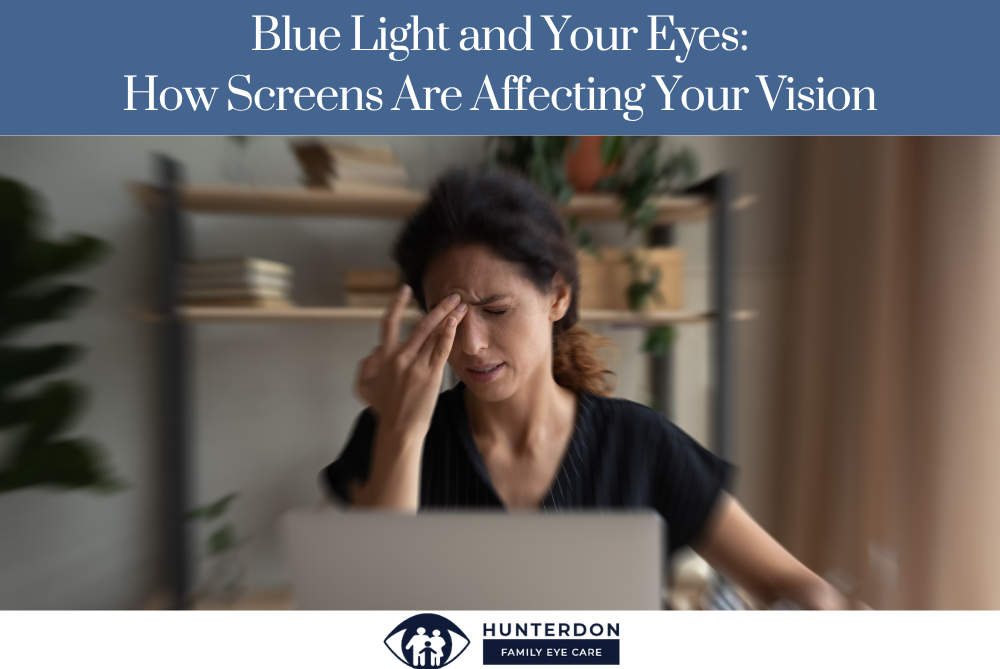In today’s digital age, many of us spend hours each day staring at screens—phones, tablets, computers, and TVs. While technology has improved our lives in many ways, it’s also introduced new challenges for our eyes. One of the biggest concerns? Blue light.
At Hunterdon Family Eye Care, we want to help you understand how blue light affects your vision and what you can do to protect your eyes from digital eye strain.
🔵 What Is Blue Light?
Blue light is a type of high-energy visible (HEV) light that is emitted naturally by the sun—but also by digital screens and LED lighting. While exposure to natural blue light during the day helps regulate our sleep-wake cycle, prolonged exposure to artificial blue light—especially at night—can have negative effects.
👓 How Blue Light Affects Your Eyes
- Digital Eye Strain: Also known as Computer Vision Syndrome, symptoms can include dry eyes, headaches, blurred vision, and neck or shoulder pain.
- Disrupted Sleep: Blue light exposure at night can interfere with melatonin production, making it harder to fall asleep.
- Potential Long-Term Damage: Ongoing studies are exploring whether cumulative blue light exposure may contribute to macular degeneration over time.
✅ Ways to Protect Your Eyes
- Blue Light Filtering Glasses: These lenses filter out a portion of harmful blue light and are great for screen-heavy jobs or students.
- 20-20-20 Rule: Every 20 minutes, look at something 20 feet away for at least 20 seconds to reduce eye fatigue.
- Adjust Your Screen Settings: Lower brightness, increase contrast, and enable “Night Mode” or “Blue Light Filter” on your devices.
- Proper Lighting and Ergonomics: Avoid overhead glare and make sure your screen is positioned just below eye level.
- Take Regular Breaks: Step away from the screen every hour to give your eyes a rest.
❓ Q&A: Frequently Asked Questions
Q: Is blue light from screens really harmful?
A: While blue light in small amounts is not harmful, overexposure—especially from close-range digital screens—can lead to strain, disrupted sleep, and possible long-term risks.
Q: Can I use my phone at night if I wear blue light glasses?
A: Blue light glasses can help reduce exposure, but it’s still best to limit screen time at least an hour before bed for optimal sleep.
Q: Are kids more vulnerable to blue light?
A: Yes. Children’s eyes absorb more blue light than adults, and they often use devices for extended periods. Blue light protection is especially important for young users.
Q: What if I already wear prescription glasses?
A: You can get prescription lenses with a blue light filter built in—just ask our team at your next appointment.
Q: Can blue light cause permanent damage to my eyes?
A: More research is needed, but excessive exposure may contribute to eye aging and retinal damage over time.
Protect Your Eyes with a Personalized Approach
If you’re feeling the effects of screen time, we can help. At Hunterdon Family Eye Care, we offer blue light filtering lens options and personalized recommendations to keep your eyes comfortable and healthy.
📞 Call (908) 730-6774
📍 Beaver Brook Concourse
1465 Route 31 South Ste. 22 Top Floor
Annandale, NJ 08801
📞 (908) 730-6774

